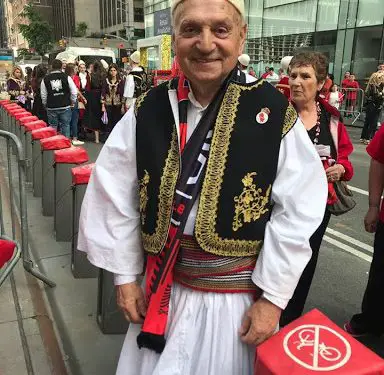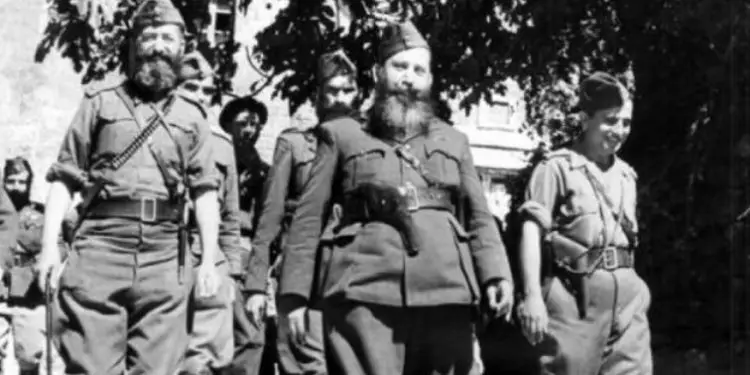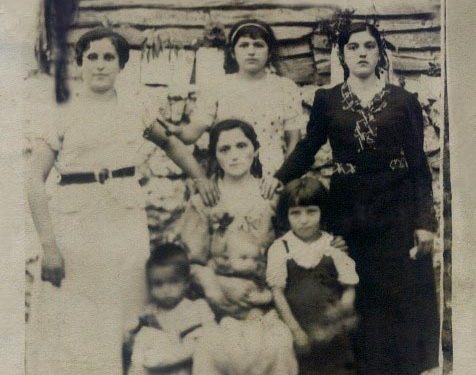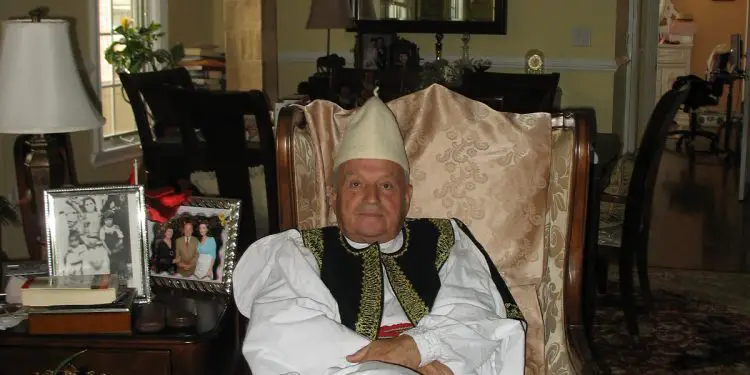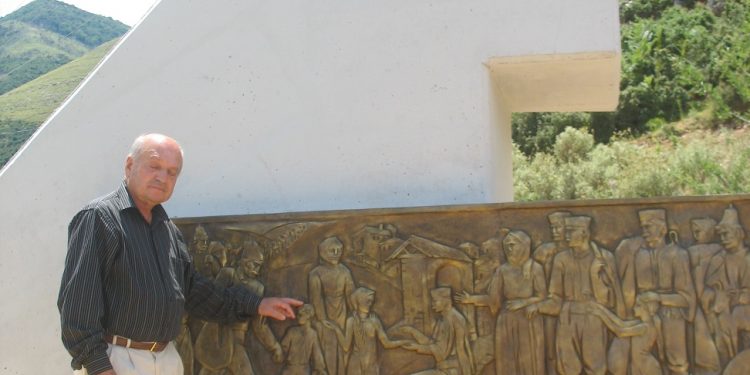Dashnor Kaloçi
Memorie.al publishes some of the unknown stories of massacres against the autochthonous Cham Muslim population in the cities of Paramtihia, Parga, Filati, Margellic, etc., committed by Greek chauvinists in the early 1940s. Rare testimony of 85-year-old Sali Bollati, originally from Paramithia and living in the USA, former lecturer at the Faculty of Natural Sciences in Tirana and for many years as President of the Patriotic Association “Chameria”, regarding the massacres of forces of General Napolon Zerva to his family, where he has been an eyewitness to the brutal and inhuman violence they exercised against the defenseless Cham population, carrying out an ethnic cleansing there, with mass displacement from their native lands.
“My grandfather, Muharrem Bollatin, 82, was dragged down the stairs and killed in the backyard. My father, 52, was tortured and killed inside the mosque. My 13-year-old brother was also killed where he was hiding in a bush, while in Paramithia prison where we were held for 6 months, along with dozens of others, my 76-year-old grandmother, 5-year-old brother and 2-year-old sister died. Our cousin, Sanije Bollati, was burned alive, while the old man Osman Murati, after being skinned alive, was glued back with salt. These are a part of the tortures and massacres that he commits in my city, and then, with the same animal, in the city of Parga, Margellic and finally in Filat and in all the villages of Chameria”.
This is the shocking testimony of 67-year-old Sali Bollati, originally from Chameria and living in the USA, who for several years when he was in Tirana, has headed the Patriotic Patriotic Association “Chameria”. Regarding the inhuman crimes committed by the Greek chauvinists at the expense of the Cham population, we know the exclusive interview of Mr. Bollati, for Memorie.al, who in addition to being an eyewitness and has tried them at the expense of his family, for years he has also collected a number of testimonies from various authors who have dealt with the Cham issue and have published them in several books.
Mr. Bollati, at the beginning of this interview, can you tell us something briefly about yourself?
I was born in 1936 in the town of Paramithi in Chameria, where our family comes from. Since then, as a result of the massacres of Greek chauvinists against the Muslim population of the Albanians of Chameria, we moved from our lands to Greece and came to Albania. I graduated from the Faculty of Natural Sciences in Tirana, where I later worked as a lecturer. Since 1998, I have settled in the USA, where I currently live.
What can you tell us about Chameria and the policy pursued by the Hellenic state towards its Muslim population?
For almost 50 years in a row, a great bitterness has been poured on the indigenous inhabitants of Chameria with the filthiest slander. How many victims, how many crimes, how many massacres the population of that area has experienced! And as if the extreme Greek genocide were not enough, how many unscrupulous slanders were leveled against that people who went through the ordeal of unimaginable suffering during a century that was too sad for them. A ghastly fate made the people of that province the object of the inhuman extermination of a large mass of fanatics drugged by religious hatred. The blade of the strike has been the Chams of the Islamic faith. The Greeks could not conceive of how two communities, with different faiths, belonged to the same people. And in view of their fixed and backward idea, they exercised a deep discrimination among the Cham population, trying, by all means, to arouse discord among them.
How did the Muslim Chams live with the Orthodox ones in their native lands in Greece?
In the province of Chameria, as in all other Albanian provinces, there was a complete harmony and understanding between the Orthodox Chams and the Muslim Chams. The kinship continuations, belonging to both faiths, of many families such as: Robaj, Klefta and others are known. Even from wealthy families like Pronjat, there have been marriages of Albanians of different religions. A phenomenon that proved that: in addition to the land where they were born, they were united by language, songs and dances, customs and traditions. The struggles of the beys of Chameria against the Pasha of Ioannina to protect the Albanian brothers of Sul have remained unforgettable. And this happened because they had a strong sense of the same ethnicity as the brave and inflexible Suliots. In contrast to this Albanian attitude, the Greek one was completely different. In accordance with the chauvinist policy of “Megaliida”, since the occupation of Chameria in 1913, the Greek authorities have considered the Orthodox Chams as Greeks, while the Muslims as Turkish-Albanians. The persecutions, expropriations, prohibition and non-opening of any school in the Albanian language had the sole purpose of denying the Albanianness of Chameria.
How would you comment on the accusation that “the Chams were collaborators of the German Nazis” and what is the real reason for the displacement of the Cham population from their lands?
A statement that testifies to a lamentable logic. Unfortunately, Mr. Nikola Gajxh did this a few years ago, during his visit to Albania. The real reason for the massacre and forcible displacement of the Muslim population of Chameria from its millennial ethnic lands lies in the chauvinist Greek policy of “Megaliida”. In the old Greek intentions for the annexation of southern Albania, there was a very disturbing obstacle for the drafters of the Hellenizing program of the Balkans: the Albanian province of Chameria. That province, with history, toponyms, traditions, culture and Albanian language, as for the Cham-Orthodox Albanians. I am illustrating this with the testimony of the scholar S. Muselimi, written in “Istoriko Peroato ana tis Thesprotia” – published in Ioannina in 1974, who writes, among other things: “Testament in the Albanian language, because the believers who came to church did not understand a word of Greek.” As for the Cham Muslim Albanians, he turned into a living absurdity the whole idea of the great expansion of Greece to the North. It was necessary to “cleanse” that province from the autochthonous Albanians, in order to make possible the realization of the annexation program of the so-called “Vorio-Epir”. A program that has remained on the agenda of almost all Greek political forces to this day.
Something more specific about the treatment of the Albanian population of Chameria during the Second World War?
In 1940, before the outbreak of the Italo-Greek war, thousands of Albanian men from Chameria, aged 13 to 70, were interned in the Aegean islands and the Peloponnese. There they were mistreated and massacred by the Greek authorities for the sole reason that they were Albanians, leaving their children, wives and mothers at the mercy of fate, to be mistreated even more cruelly. Many were found dead in Greek concentration camps. While the Cham boys who were called to perform military service, in the ranks of the Greek army, were not equipped with weapons, but only with pickaxes and shovels, to work as slaves. This has been confirmed by the researcher Miranda Vickers, in her study “Albanian Modern History”. These Greek citizens were discriminated against and persecuted only because they were Albanians.
How old were you when you left Chameria and do you remember that time?
I was only 4 years old when in my hometown, in Paramithi, after 31 years of Greek occupation, the Albanian Flag was raised. People, excited, sang the Flag Hymn. We children danced and played, while the older ones cried with joy that the sufferings under the Greek occupation were over, and finally we would feel Albanian in our homes, without going too deep into the situation in which our much-desired flag was raised. After a long terror and persecution to the limits of patience, the arrival of a more lenient regime, although also the occupier, but which accepted the Albanian ethnicity of the province, could not help but mislead some ordinary people, who in after all they did not have that horizon we have today, to judge that even those who came, were again invaders. But here another very significant fact must be underlined. Before long, the most conscientious Cham boys formed one of the first formations of the war against the fascist occupier, The band “Chameria”.
What was the contribution of the Cham population against the German occupiers?
The broad patriotic horizon, the dedication, ingenuity and sacrifice of the brave Cham youth, should be appreciated even more than those of a Greek partisan, to whose nation the Germans had been brought with extreme barbarism and who was naturally involved unequivocally in partisan units. While the Albanians of Chameria, although they went from a wilder occupation to a milder one, again they despised it by going to the mountains for freedom and setting up the above-mentioned gang. That combat squad, in February 1943, grew up in the Battalion “Chameria” which has fought fiercely against the invaders. The 56-day war against German forces in August-September 1943 has remained legendary. It is the only anti-German frontal war on Albanian soil. Thanks to the bravery of the Cham boys and girls, the Germans could not invade Albania on the Chamerian side, but were forced to cross the Three Bridges in Leskovik (See “History of LANÇ”, Tirana 1986). And these Cham boys and girls continued the fight against the invaders in the ranks of the VI Division of the Albanian National Liberation Army until his expulsion. At the same time, over 500 other Cham boys joined the ranks of ELAS, where they made up the majority in the XV Regiment, along with the Macedonians of Greece, against the Nazi occupiers. This is the truth of the so-called “cooperation” with the invaders. If from the ranks of the Cham population, suffering under the Greek regime since 1913, some elements exalted by fascist propaganda for the alleged unification of Albania have emerged, can there be a law in the world, principled or moral, that for the deeds of these individuals to torture, rape, massacre and massively displace an entire people?
Did the Greeks themselves cooperate with the German Nazis during World War II?
It is not the Chams who are guilty of collaborating with the occupiers, it was the Greeks themselves who blamed Ralis, Zerva and all those numerous allies with the Nazi-Fascists who came under their command against the people who gave birth to them. Let us recall, for example, the massive cooperation of the Greek right-wing forces with the Nazis, under the leadership of the infamous General Zerva. The German occupiers set up the Ralis quisling government in Athens. The Englishman M. Mazower, in “Inside Hitler’s Greece 1941-1944” (London 1993) writes, among other things, about the turbulent alliances and alliances of the Greek right-wing forces of Zerva with the Nazi occupiers. It states: “In Athens, members of EDES, commanded by Zerva, entered the service of German-created security battalions to maintain order in the country and, moreover, to clear Greece of communist elements. At the same time, EDES leaders maintained close ties with the Ralis quisling government. According to the British documents described in the book above, the British insisted that Zerva sever ties with the quisling government of Athens, but he continued the double game, extending that he was strongly engaged in the fight against the Nazi invaders, on the other hand reduced hostilities. to local German forces, even holding a liaison officer near the German headquarters in Ioannina.
Wodhouse’s book, The Struggle for Greece (London 1976), states, among other things: “With the outbreak of the Civil War, German documents leave no doubt that Zervas had made a ceasefire with them for several months which he has judged him completely wrong, as if he were not in conflict with his obligations to the allies. ” It is precisely these characters of General Zervas’s EDES forces, assisted by those of the collaborationist, Colonel Derlitis, commander of the Security Battalion who launched attacks and massacres against the villages and towns of Chameria with the aim of ethnic cleansing of that population. Here is what the Greek-German scholar Georgia Kretsi writes: “On June 27, 1944, the forces of the 10th Division of EDES, commanded by Kamaras, with the approval of the retreating German forces, entered Paramithi. EDES proclaimed that all Muslim Chams would be free and not mistreated and that their property would be protected. Completely treacherously (the traditional Greek way) they started brutal ethnic cleansing. In this city alone over 300 Muslim Chams, innocent people, mostly women and children, were found dead.
What was the fate of your family when she was in Greece? What do you remember from that time?
I have fixed in my memory since childhood, a torturous, heavy, exhausting, creepy testimony that had happened to my family. In 1940, my grandfather, 82-year-old Muharrem Bollat, was dragged down the stairs and killed in the backyard, my 52-year-old father was tortured and killed inside the mosque, my 13-year-old brother was also killed where he was hiding, in a bush. While in Paramithia prison where we were held for 6 months together with dozens of others, my 76-year-old grandmother, 5-year-old brother and 2-year-old sister died. Our cousin, Sanije Bollati, was burned alive, while the old man Osman Murati, after being skinned alive, was glued back with salt. These are just a part of the tortures and massacres he commits in my city, and then, with the same animal, in the city of Parga, Margellic and finally in Filat and in all the villages of Chameria. Jani Shara (I. Sarras), in his book “Istoria tis Periohis Igoumenitsa”, published in Athens in 1985, writes, among other things, “The family of Muharrem Bollati, who was brutally massacred, was not at fault.” As Napoleon Zerva prides himself on his atrocities, writing to a friend in 1956: Hellenism and made it possible for the highlanders to descend to the plains” (S. Muselimi“Istoriko Peripati ana ti Thesprotia ”, Ioannina 1974).
But after World War II, what was the official attitude of Greece towards the infamous general, Napoleon Zerva?
Napoleon Zerva was also a minister in post-war Athens governments. Subsequently, thanks to international pressure, especially from the US, after his connections with the Nazis were revealed, Zerva was forced to resign from the Greek government. However, he remained an “honored figure” by the Greek authorities. His statue, with his face and hands led by Albania, stands in the center of one of the cities of the martyred Chameria./Memorie.al





